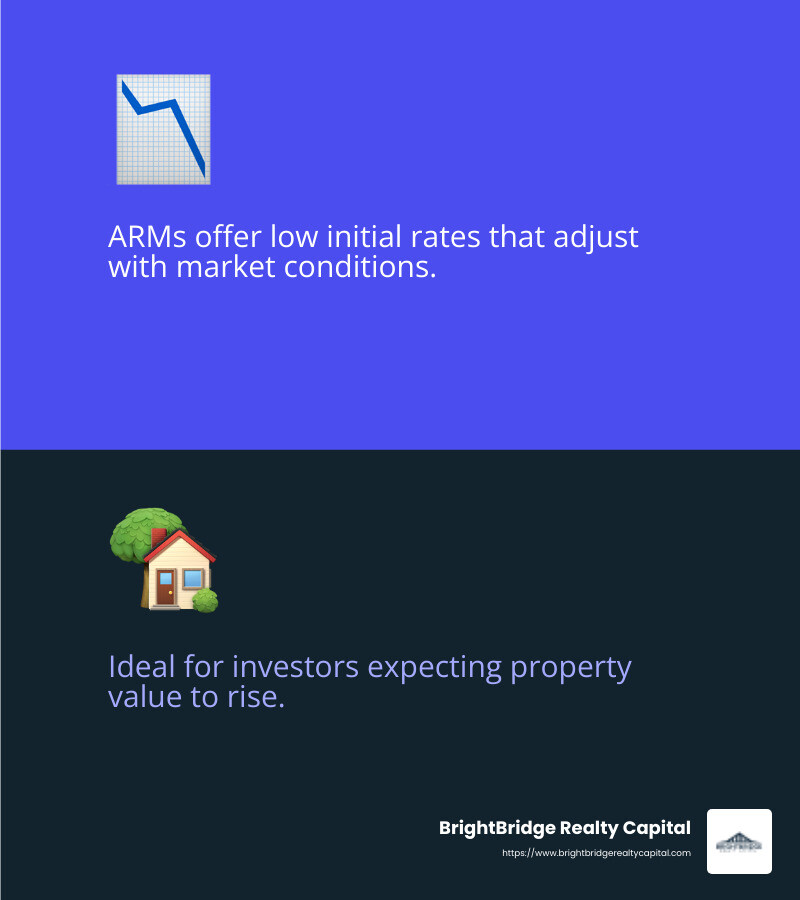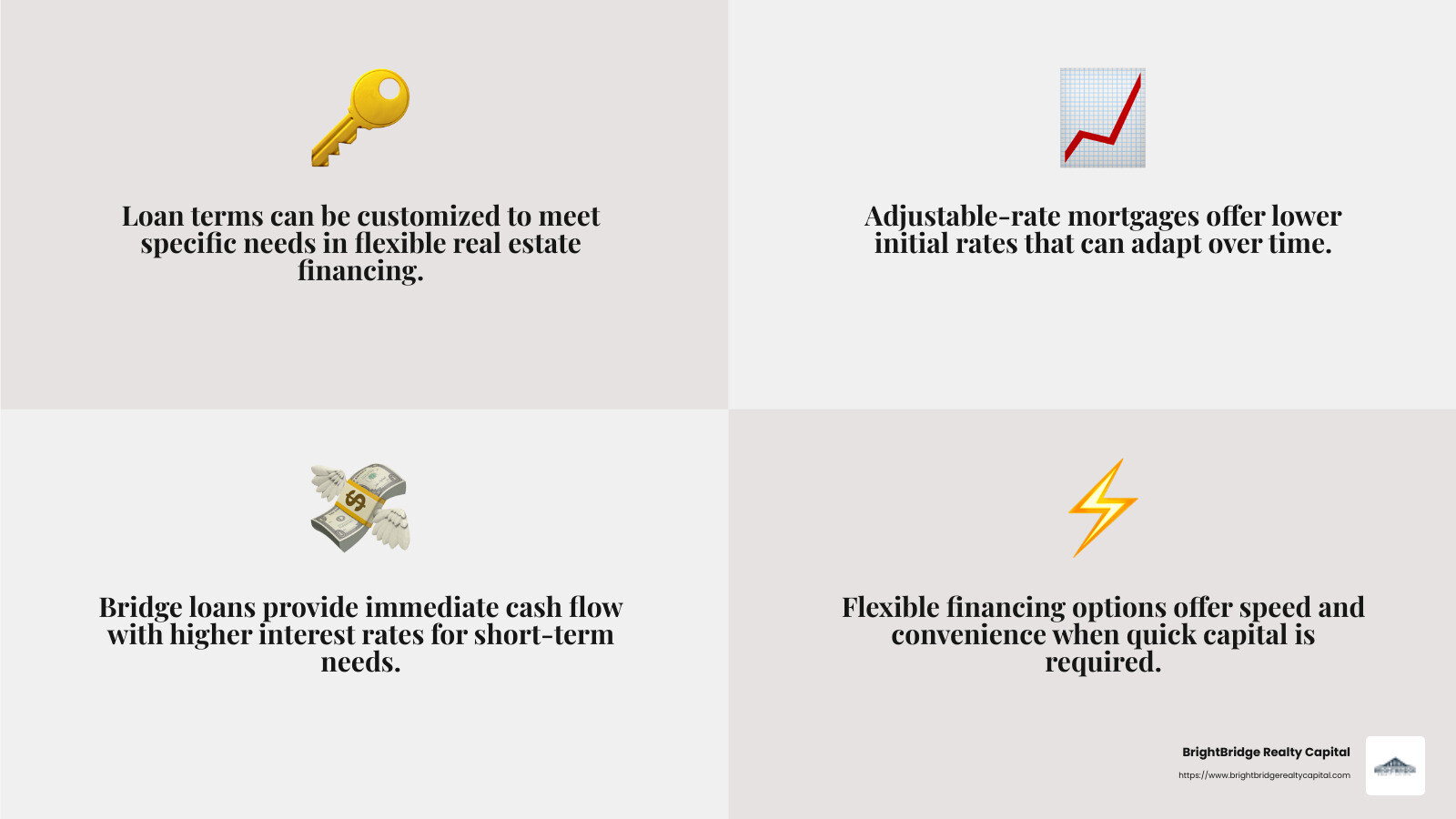The Flexible Path: Real Estate Financing Options for Investors

Flexible real estate financing offers investors a dynamic way to secure funds needed for diverse property endeavors. Whether you are eyeing a prime rental property or planning to flip houses, these adaptable financing options are custom to meet your specific investment demands.
Here's a quick overview of popular flexible financing options for real estate investors:
- Adjustable-Rate Mortgages (ARMs): These offer low initial rates that adjust with market conditions.
- Bridge Loans: Provide short-term financing solutions for immediate cash flow.
- Seller Financing: Enables buyers to make payments directly to the seller, bypassing conventional loans.
- Asset-Based Income Programs: Offer flexible terms and cater to moderate wealth investors.
These options can empower you to capitalize on investment opportunities with speed and efficiency, especially when traditional loans seem cumbersome or slow.
Flexible financing can pave the way for your property investment ventures, enabling you to seize opportunities and expand your portfolio with ease. Real estate investors recognize the necessity of quick and reliable funding solutions. Companies like BrightBridge Realty Capital in New York NY are committed to providing competitive rates and efficient processes to support your investment goals. Opt for the right financing and open up the potential to grow your real estate empire.

Flexible real estate financing glossary:
Understanding Flexible Real Estate Financing
When it comes to flexible real estate financing, three key options stand out for investors: Adjustable-Rate Mortgages (ARMs), Bridge Loans, and Wrap-Around Loans. Each offers unique benefits custom to different investment strategies.
Adjustable-Rate Mortgages (ARMs)
Adjustable-Rate Mortgages start with a low interest rate, making them attractive for investors looking to minimize initial costs. These rates adjust over time based on market conditions. This means you might start with lower payments, but they can increase if interest rates rise.
For instance, if you're investing in a property expecting its value to rise, an ARM can be a smart choice. You benefit from the lower initial payments and can sell or refinance before rates potentially climb.

Bridge Loans
Bridge Loans are perfect for those needing quick, short-term financing. They provide immediate cash flow, helping investors seize opportunities without the wait of traditional loan processes.
Imagine you're selling one property and buying another. A bridge loan can cover the gap, giving you the funds to purchase the new property while waiting for the old one to sell.
These loans are usually short-term, ranging from six months to a year, and are often used to "bridge" the gap during transitions.
Wrap-Around Loans
Wrap-Around Loans are a creative way to finance properties. They involve the seller financing the buyer's mortgage, while the original mortgage remains in place. The buyer makes payments to the seller, who then pays the original lender.
This method can be beneficial in a tight lending market. It allows buyers to negotiate terms directly with sellers, often leading to more flexible payment schedules.
Wrap-around loans are particularly useful if you're dealing with a seller who is willing to finance the purchase, potentially offering better terms than a bank.
Flexible financing options like these are essential tools for investors aiming to maximize their real estate ventures. They offer the adaptability needed to steer the ever-changing market, ensuring you have the right funding at the right time for your investment goals.
Next, we'll explore the key benefits of flexible real estate financing, highlighting how these options provide faster access to capital, personalized solutions, and competitive rates.
Key Flexible Financing Options for Investors
Adjustable-Rate Mortgages (ARMs)
Adjustable-Rate Mortgages kick off with a low interest rate, making them appealing for investors who want to keep initial costs down. Over time, these rates adjust based on market conditions, which means your payments can increase if interest rates rise.
Consider this: If you're investing in a property and expect its value to increase, an ARM can be a strategic choice. You can enjoy the lower initial payments and potentially sell or refinance before rates climb.
Bridge Loans
Bridge Loans are ideal for investors needing quick, short-term financing. They provide immediate cash flow, enabling you to seize opportunities without the lengthy wait associated with traditional loans.
For example, if you're in the process of selling one property and buying another, a bridge loan can cover the financial gap. This allows you to purchase the new property while waiting for the old one to sell.
Typically short-term, lasting from six months to a year, bridge loans are often used to "bridge" the gap during transitions, providing much-needed liquidity.
Seller Financing
Seller Financing eliminates the need for upfront payments by allowing the property seller to act as the lender. This means the buyer makes installment payments directly to the seller.
This method can expedite transactions and offer flexibility, especially for buyers who might not qualify for traditional loans. It's particularly beneficial in a tight lending market, where securing a bank loan is tough.
In owner-financed deals, buyers and sellers can negotiate terms, potentially leading to more favorable agreements than those offered by banks.
Asset-Based Income Programs
Asset-Based Income Programs offer generous terms for those with moderate wealth. These programs consider the value of your assets rather than just your income, making them a great option if you have substantial assets but irregular income.
This type of financing provides flexibility, allowing you to leverage your wealth to secure the funds you need. It's especially useful for investors with a diverse asset portfolio looking to expand their real estate ventures.
Flexible financing options like these are essential tools for investors aiming to maximize their real estate ventures. They offer the adaptability needed to steer the ever-changing market, ensuring you have the right funding at the right time for your investment goals.
Next, we'll explore the key benefits of flexible real estate financing, highlighting how these options provide faster access to capital, personalized solutions, and competitive rates.
Benefits of Flexible Real Estate Financing
Flexible real estate financing is a game-changer for investors. It offers several key benefits that can make all the difference in a competitive market.
Faster Access to Capital
One of the biggest advantages is speed. Traditional loans can take weeks or even months to process, but with flexible financing, you can often access funds much quicker.
This speed is crucial when you're trying to close a deal in a hot market. For example, private lending can provide capital within days, allowing you to act swiftly on opportunities. This quick access can be the difference between securing a property and missing out.
Personalized Solutions
Another benefit is the ability to tailor financing to your specific needs. Unlike traditional loans, which often come with a one-size-fits-all approach, flexible financing offers personalized solutions.
Whether you're looking to fix and flip properties or hold them for rental income, there are options that can be customized to fit your strategy. This means you can align your financing with your investment goals, ensuring you have the right support to grow your portfolio.
Competitive Rates
While flexible financing options like bridge loans and adjustable-rate mortgages might have higher interest rates initially, they often offer competitive terms that can work in your favor.
For instance, ARMs start with lower rates, which can help reduce initial costs. If you plan to sell or refinance before the rates adjust, you can take advantage of these lower payments.
Additionally, by negotiating terms directly with lenders or sellers, you might secure rates and conditions that are more favorable than those offered by traditional banks.
These benefits make flexible real estate financing a valuable tool for investors. With faster access to capital, personalized solutions, and competitive rates, you can steer the real estate market with confidence and agility.
Next, we'll dive into the mortgage application process, providing tips on navigating loan terms, borrower qualifications, and property factors.
Navigating the Mortgage Application Process
The mortgage application process can seem daunting, but understanding the key components can make it much smoother. When it comes to flexible real estate financing, there are three crucial areas to focus on: loan terms, borrower qualifications, and property factors.
Loan Terms
Loan terms define the conditions of your mortgage. These include the interest rate, repayment schedule, and any fees involved. With flexible financing, terms can often be custom to meet your specific needs. For instance, adjustable-rate mortgages (ARMs) offer lower initial rates that can adjust over time. This can be beneficial if you plan to sell or refinance before the rate changes.
Bridge loans are another flexible option, providing short-term financing to cover immediate needs. They typically come with higher interest rates, but the speed and convenience they offer can outweigh the cost when you need quick capital.

Borrower Qualifications
When applying for a mortgage, lenders will assess your qualifications. This includes your credit score, income, and debt-to-income ratio. For flexible financing, the focus may shift slightly. Private lenders, for example, might prioritize the value and potential of the property over your credit score.
This flexibility can be a huge advantage if you have a less-than-perfect credit history but a strong investment strategy. However, it's still important to ensure your financials are in order. Having a clear understanding of your financial situation will help you present a strong case to potential lenders.
Property Factors
The property itself plays a significant role in the mortgage application process. Lenders will look at the property's location, condition, and market value. For investors, the potential for rental income or resale value is also key.
In flexible financing scenarios, the property's potential can sometimes outweigh other factors. For example, a fix-and-flip project with a solid plan and projected profit can make you an attractive borrower, even if your personal financials aren't perfect.
Understanding these property factors can help you choose the right financing option and increase your chances of approval.
By focusing on these areas, you can steer the mortgage application process with confidence. Next, we'll address some common questions about flexible real estate financing to further clarify this dynamic field.
Frequently Asked Questions about Flexible Real Estate Financing
What is flexible real estate financing?
Flexible real estate financing refers to a variety of loan options that adapt to your unique financial needs and real estate goals. Unlike traditional loans, these options often provide more adaptable terms, such as adjustable-rate mortgages (ARMs), bridge loans, and seller financing. This flexibility can be particularly beneficial in a competitive market where quick access to capital is essential.
How do bridge loans work?
Bridge loans are short-term financing solutions that help investors manage cash flow while transitioning between properties. Imagine you find a great investment property but haven't yet sold your current one. A bridge loan provides the funds you need to purchase the new property without waiting for the sale of the old one.
Here's how they work:
- Short-Term Solution: Typically, bridge loans last from six months to a year, giving you time to sell your existing property.
- Higher Interest Rates: These loans often have higher interest rates compared to traditional mortgages due to their short-term nature.
- Quick Access to Funds: One of the main advantages is the speed of approval, often within days, allowing you to act fast in a competitive market.
What are the benefits of adjustable-rate mortgages?
Adjustable-rate mortgages (ARMs) offer several benefits for real estate investors:
- Initial Low Rates: ARMs typically start with lower interest rates than fixed-rate mortgages, reducing initial payments and making them attractive for short-term investments.
- Rate Adjustments: After the initial period (often 5, 7, or 10 years), the interest rate adjusts based on market conditions. If you plan to sell or refinance before the rate changes, you can benefit from the lower initial rates without facing future increases.
- Potential for Savings: If market rates decrease, your payments could be lower than with a fixed-rate loan, offering potential savings over the life of the loan.
These flexible financing options provide investors with custom solutions that can align with their specific investment strategies and timelines.
By understanding these key aspects of flexible real estate financing, you can make informed decisions that align with your investment goals. Next, we'll explore how BrightBridge Realty Capital can help you with customized solutions and fast closings.
Conclusion
At BrightBridge Realty Capital, we understand that every real estate investor has unique needs and goals. That's why we specialize in customized solutions that adapt to your specific situation, whether you're flipping houses, building new properties, or expanding a rental portfolio.
One of our standout features is our ability to offer fast closings. In the world of real estate, timing is everything. Our streamlined process ensures that you can secure funding quickly—often within a week—allowing you to capitalize on opportunities as they arise.
Our approach is simple yet effective. We cut out intermediaries, providing direct lending with competitive rates. This not only speeds up the process but also improves transparency and trust in our dealings.
With our flexible real estate financing options, including bridge loans and adjustable-rate mortgages, you can steer the complexities of the market with confidence. We provide the tools and support you need to make informed decisions and achieve your investment goals.
For those ready to explore these custom solutions and experience the benefits of swift, hassle-free funding, we invite you to learn more about what BrightBridge Realty Capital can offer. Find how we can support your real estate ventures with our customized financing options.
Take the flexible path with us and turn your real estate aspirations into reality.


